#@orpheuslament
Text






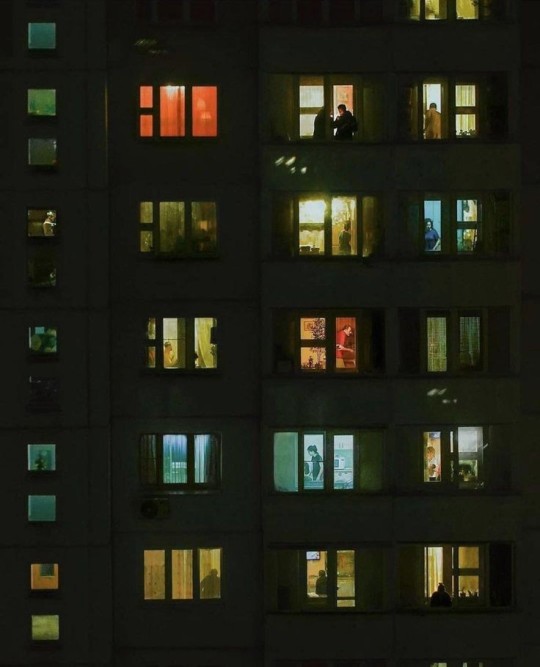
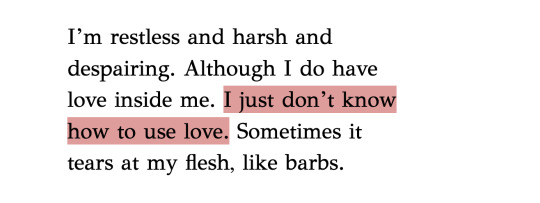
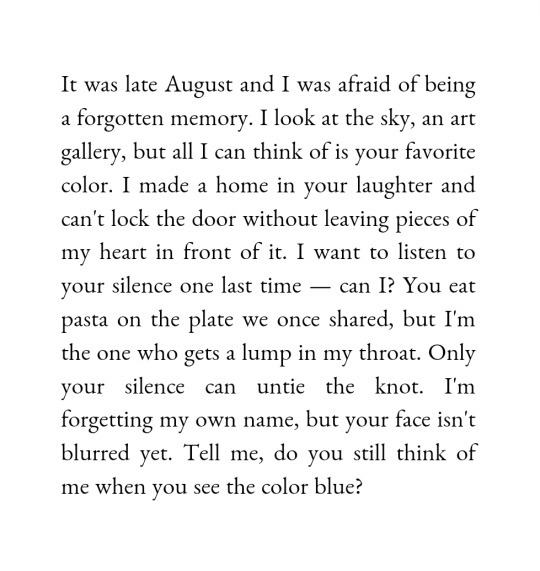
YOU BIT INTO ME AND I WASN'T AS SOFT AS YOU EXPECTED; ON PERVERTED LOVE.
i. b. vyache // unknown // isabel allende // dante émile (@orpheuslament) // rainer maria rilke // florence + the machine // unknown // clarice lispector // @ruhlare
#rainer maria rilke#i. b. vyache#isabel allende#dante émile#orpheuslament#florence + the machine#clarice lispector#writing#poetry#quotes#web weaving#webweaving#.w
4K notes
·
View notes
Text
About once a week the world smiles at me so wide I can’t bear to look at it– suddenly there is so much light everywhere I fear I will go blind. Maybe it’s the way a stranger says excuse me while slipping by a crowd, the magpie hopping along next to the train tracks, the little bats fluttering around at sundown. I don’t know what it is but the sudden realization that I am alive & the earth is often kind. Isn’t that marvelous? How strange it is to open your eyes to another fresh morning & knowing you can start over at any point
Dante Émile, from "Listening to The Mountain Goats while on public transport"
#q#quotes#dante emile#orpheuslament#listening to the mountain goats while on public transport#life everlasting#m#x
2K notes
·
View notes
Text


#will graham#hannibal lecter#hannibal#nbc hannibal#hanni memes#hannibal edits#hannibal memes#hannibal edit#hannibal textpost#hannibal nbc#hannigram#nbc hannigram#orpheuslament
744 notes
·
View notes
Text



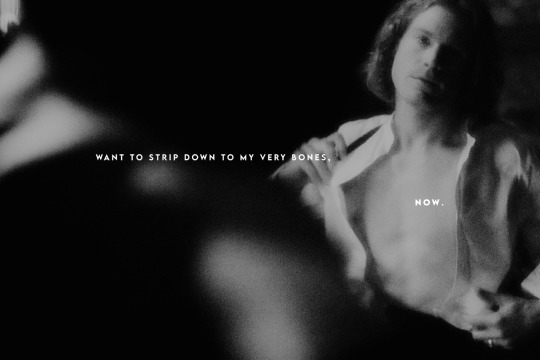
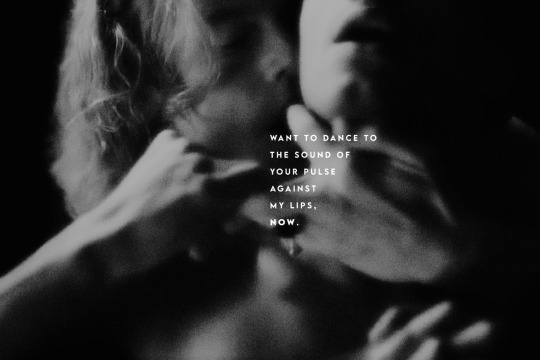

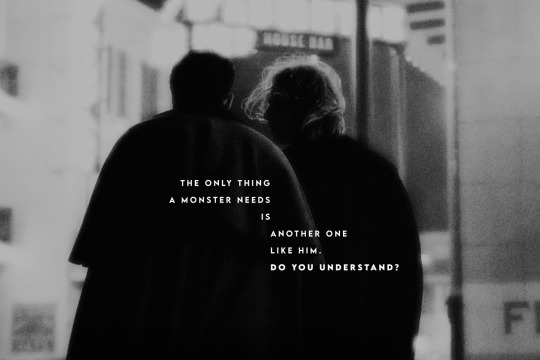

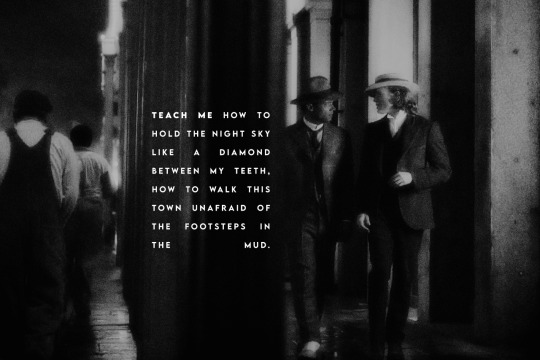
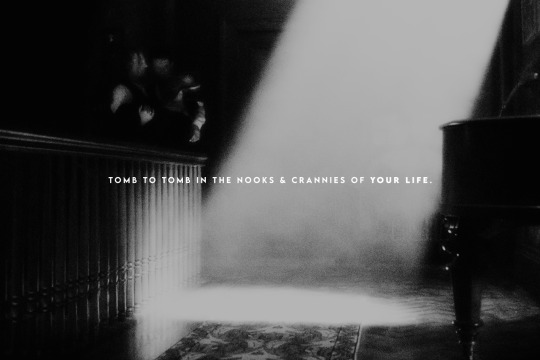
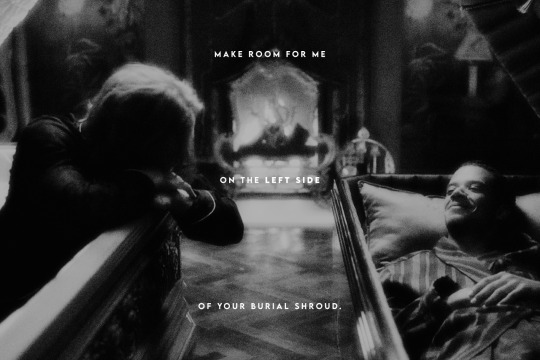
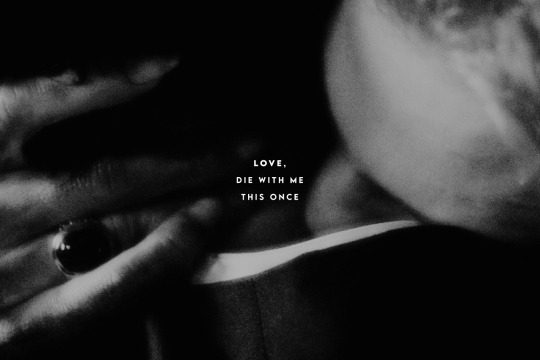

Love Song for Two Vampires, Dante Émile
#iwtvedit#iwtvsource#vcsource#iwtv#amc iwtv#interview with the vampire#amc interview with the vampire#loustat#lestat x louis#lestat de lioncourt#louis de pointe du lac#usertags#userteags#userrobin#orpheuslament#*g
664 notes
·
View notes
Text

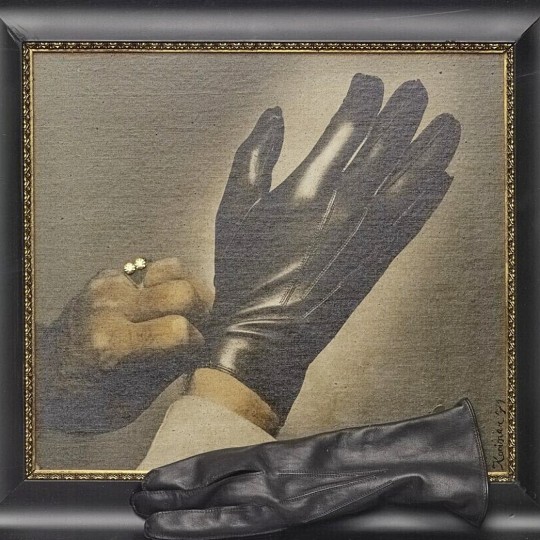

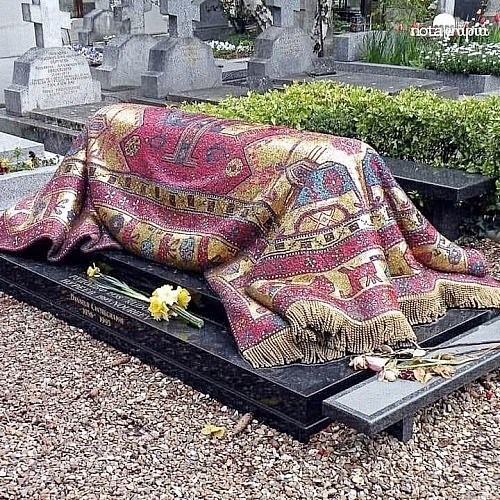

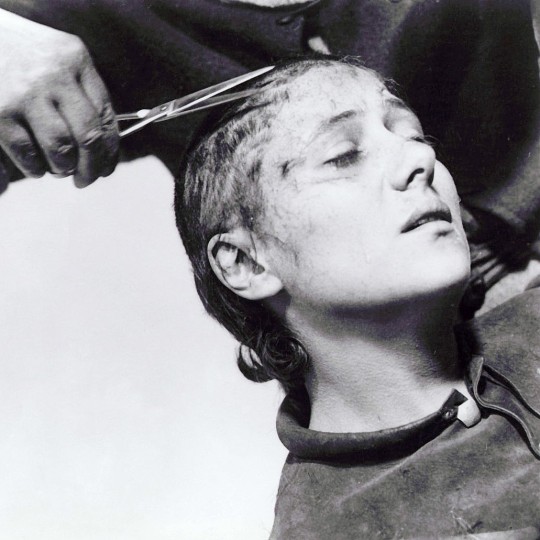
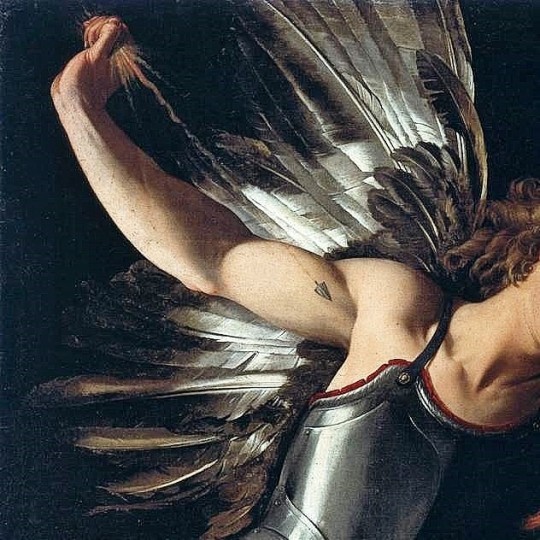

mutual archive moodboards
➢ @orpheuslament
125 notes
·
View notes
Text
Blood & Brothers: A Close Reading and Analysis of Dante Émile's "Dioscuri"
Blood and Brothers: A Close Reading of “Dioscuri” by @orpheuslament. By Sophie E. Eikli. Available on Substack.
The world is formed anew, as is our vocabulary. Tumblr poet Dante Émile begins his piece with a title, Dioscuri, which holds no meaning as can be divined through English language save for a single title given to a unique dynamic. The word refers specifically to that dynamic of those poorly fated twins from Greek mythology; Castor and Pollux. They are the masculine in the divine-and-mortal set of twins, having been born alongside Helen and Clytemnestra out of the nonconsensual union of Zeus and Leda. The word itself comes from the Greek ‘Dioskouroi’ meaning ‘Sons of Zeus’. The word may also whisper of similarity to the English ‘obscure’, something which is definitely present in the piece by Émile.
The piece begins in conversation with a seemingly invisible speaker. “Your blood is my blood is your blood is my blood,” uttered by an unknown voice to an unknown recipient. This sentence is repeated twice more in the poem, at the middle and at the closure. The pronoun ‘your’, is also repeated steadily over the course of the piece, while “I” is never named- save for the invisible, yet heady I present in the repetition of “my” in the line which has already been named. This proves the existence of a first-person speaker kept tantalisingly out of the reader’s grip, without revealing its identity. Is it Émile commenting through his own work, projecting to a specific person in an act of poetic espionage? Is it Pollux to his mortal and less radiant twin? Is it Castor to the son born as what he is not; glory and divinity? My suspicion is that the truth lies somewhere between the latter options, and that the unsureness is deliberate. Castor and Pollux’s blood is the same, not just genetically but in reality. The line “your mother never looks you in the eye” could indicate that it is Castor speaking to Pollux, but this is something that cannot, and should not be, confirmed. Although fraternal, they both carry the traits and evidence of a fated conception.
Aside from its title, the poem walks a fine line between pretentious and relatable as the meat of its text keeps it grounded in modernity. There are no heady Greek words, nor are there Latin ones. And yet it brims over with the past. Émile begins by thrusting the name of Castor into the present in an act of bait-and-switch, placing the two of them in the setting of a motel bathroom, and yet the present is scarcely mentioned again. The poem laps back through time, going from a “motel bathroom” to the reflection of their “once [having been] a light to sailors” until the devastating final blow that delivers Castor and Pollux to Hades. The piece exists within a context of Greek antiquity. The present is not gone, but it barely registers against the weight of the past.
To all who grazed the Tumblr poetry sphere of the mid-to-late 2010’s, tell me if this sounds familiar: Dionysus in the present, owning a bar. Aphrodite, a stripper. Zeus, a marine or some other authority.
Those who had a Tumblr account in the mid-2010’s may be aware of the pervasiveness of Classical Greece within the poetics of that time. Many of them are gone now, their blogs reduced to half-memories and deactivated urls. While some of them, such as New Zealand’s Darshana Suresh, went on to publish a book, I have no idea if any of them continued to write. Because of time, and disappearance, and ghosts, I cannot find the exact poems to reference. Therefore, I can only ask for your belief in the fact that one thing was almost always present in a Tumblr poet’s portfolio: the Ancient Greeks in the present, haunted by a lack of belief. This is not a denigration of that poetry in the slightest; as a teenager I found myself uniquely represented in the ambitious poetry of fellow teenaged and young adult poets who often suffered with mental health problems of their own. It was also a heavily queer environment, in which there was no question at all regarding the relationship between Akilles and Patroklus. There existed a genuine artistry and love for the source material that marked it as an artistically unique subsection of poetry.
Another uniting force for the Tumblr poet community was its metaphorical patron saint; Richard Siken. An absolute crescendo of his time, Siken released the collection Crush when he was barely 19 in 2005. Even today his work entertains a sense of immortality, often being used in so-called web weaves (e.g; “Sorry / about the blood in your mouth. I wish it was mine.”(Little Beast)). Even I have a not-so-hypothetical desire for a Siken tattoo on my left arm. His work is manic, bordering on surrealistic as he blends time and space, but more than anything it is intensely physical. There are many, many times in Crush where the word ‘blood’ is used. Hearts are swallowed, cows fall from the sky like rain, houses and people are burned at regular intervals. There is also a very heavy presence of second person in his poetry.
In several ways, Dioscuri feels like a testament and subversion of these things. There is the heavy presence of the past within Émile’s poem, but it is manipulated in a way that contrasts those poems from 2015. Unlike the pieces of which I think, which could alternately place Dionysus at a bar or Ikaros in a First World War fighter, Émile begins in the present and pushes backwards into the past. The thick love of these brothers is constant and unbearable, with Pollux eventually resolving to pull his mortal brother with him into the stars. The language, too, leans progressively more into the Antique with epithets such as “God-sent white bird” – which is interestingly used to describe the “dove” that “you once buried”, rather than another white bird which is their father in the myth of Leda. – being paired with reflections on the soul dualism (“A soul splits in two, / that which has always been yours to share”) which Plato credits to Zeus in his Symposium. While a line near the beginning of the poem asks “Who in Hell knows who speaks first”, the ending describes one waking “Down in Hades.”
And yet the present does exist, reaching through Pollux’s grief for his brother killed in Troy. “I’m not reaching Heaven if it’s not with my brother,” he says to his “old man”, Zeus. While it could be a meditation on the skies to which Castor and Pollux eventually become stars, Heaven’s capitalisation leads one to wonder whether it is not a reflection of the immortality of that brotherly bond, pushing back out from that motel bathroom at the beginning of the poem. Whether it is not Pollux’s bloody and codependent love for his brother that breaches time, space, body. There is blood all over this poem, and inside of it.
There is blood everywhere, and one cannot help but notice that some of it belongs to Richard Siken. Some of the lines seem to be subconscious redirection of Siken’s images. Although it may be overreaching, one could see the “wild horses running through your hair at night” as an honouring of Siken’s “How it was late, and no one could sleep. The horses running / until that they forget that they are horses.” (Scheherezade). There is also something very resemblant in the demand to “Keep the shattered moonlight under your pillow”, which could resemble the physicality of Siken’s “Look at the light through the windowpane” (Scheherezade). Faces don’t just become bloody, but are bloody already. A bloodied fist meets a pre-bloodied nose. Catastrophe is written into the DNA of the poem right until the fateful cry of mortal Castor: What have you done, what have you done. Not a question, for the answer is known by both. The answer is them both.
For such is the love of brothers and of twins in Émile’s poem. Their love is codependent and damaging, but no more damaging than the conception that made them. The poem demands that one apologise to their mother while simultaneously reminding that “it’s not your fault if things always end this way”. They hide under covers in the motel just as they hide together in the night sky. They guard each other in every reality and every plane.
To end, I have only one request of our dear poet:
Tell me how all this, and love too, will ruin us. Tell me we’ll never get used to it.
Credits given to:
Dioscuri by Dante Émile
Little Beast, Scheherezade & others by Richard Siken
Darshana Suresh and other Tumblr poets
#poetry#spilled ink#poetry analysis#orpheuslament#richard siken#classicsblr#my writing#my analyses#long post
58 notes
·
View notes
Text

The House of God by Bee Jameson (me)
Idk man I just like being queer and queer community. Also, heavy inspiration from one of my favorite poets @orpheuslament
#poetry#prose#original work#poet#poem#poems#prose poem#poetic#original poem#poems and poetry#queer community#queer#mlm poetry#mlm poem#wlw poetry#wlw poem#tw f slur#Heavily inspired by dante emile's poetry (orpheuslament)
40 notes
·
View notes
Note
jane i wanna do a line with you so bad
dante i would literally kill and maim every person in between california and spain to do a line of coke with you.
8 notes
·
View notes
Note
2 & 13
dante when are our holy wounds going to mix blood together.
3 notes
·
View notes
Note
sab i would hang out & do coke with you forever
dante i love you <3
2 notes
·
View notes
Text
Read a poem recently that made me think differently about my transness.
We've all heard the saying about how God made you trans for the same reason he made wheat but not bread: so humans can delight in their creation. It's a beautiful image, the idea of a community coming together to transform one person into another.
This poem, however, frames it differently. None of your own feelings matter when God has plans for you. In keeping with the previous sentiment, God has plans to use my transness to bring a community together. And while that sounds good on paper, it means that one can't just live a normal life.
Oftentimes my transness feels like a burden on my life. Much like the subject of the poem, I can't just remain insignificant. It's a call to action, that I must educate people and advocate wholeheartedly for social change and give up all privacy because my gender gives me the ability to do so. But in all honesty? I don't like the childhood God has given me. I don't like never having gotten to be a normal kid or a normal teenager. I never wanted this life, never wanted to be some divine tool. I just wanted to remain insignificant. I just wanted to be normal.
But like the subject of the poem, I'm expected, designated to be a Saint. For the rest of my life, my transness will dictate my life. I will forever be a tool for God to bring people together. I will always be wheat needing to be made into bread by others. I'm always going to be another figure they can operate on and show off, like when you take a pen apart and put it back together to prove you can. All because I want to live as the opposite gender.
#the poem is called 'sharing a cigarette with joan of arc'#and it's by @/orpheuslament#their work has changed me man#transgender#trans#trans guy#trans man#transmasc#ftm#trans reality#tw hopelessness#tw religion
3 notes
·
View notes
Note
47 for the lyrics thing :]
My angel's got eyes like a housing project / He was born inside a guitar / And I can't forget his red lips and eyelashes / And his "How'd we end up where we are?
#letters#orpheuslament#honourable mention for 'and we're re-arranging furniture / in a burning house'#thank u dante <333
3 notes
·
View notes
Text
i wish i could realistically post my poems as pictures of text in a nice font :/ unfortunately my poems are never in the convenient bite size they would need to be
#valentine notes#problems that would be solved if i took multiple screenshots but#i need to figure things out.#going to the blogs of tumblr users sweatermuppet and orpheuslament to study the art of posting rebloggable poetry
3 notes
·
View notes
Note
🎸!
hii dante <3
stab - bratmobile
for an old kentucky anarchist - the orphans
the sea is a good place to think of the future - los campesinos!
elijah - the mountain goats
jesus christ - brand new
given that i am shuffling my entire library i'm not expecting these to make any sense but wow, that's a weird one. not sure what this means for you. good luck king.
4 notes
·
View notes
Note
1 quastion. whats ur favourite poem
do u even know how many poems there are in the world. and u want me to choose just one..
#probably something by kevah akbar for obvious reasons#& ur poem ‘after abel’ will always always be a fav#orpheuslament#asks
4 notes
·
View notes
